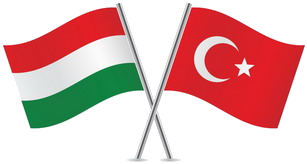Bilateral Relations

The political relations between Hungary and Turkey have been historically friendly, based on the amity between the two peoples. The bilateral ties have strengthened and the dialogue deepened in the last decades.
The establishment of the "High Level Strategic Cooperation Council" (HLSCC) between the two countries in 2013 during the visit of President Erdoğan in Hungary is a testament of the close political relations between the two countries. The HLSCC provides an opportunity for the President and Prime Minister of the two states to discuss the development of the relations of the two nations and formulate a strategy for further improving co-operation. The last meeting of the biennial Council occurred in 2019 in Budapest, the next one is scheduled to take place in 2021.
Common bonds are also strong on the ministerial level, especially between the ministries responsible for foreign affairs as mutual visits are regularly on the agenda. Hungary supports the EU membership of Turkey, and the two countries frequently collaborate in the framework of NATO and the UN, as well as other international organizations.
Interparliamentary relations are also strong, the President of the Turkish Grand National Assembly, Binali Yıldırım visited Hungary on the occasion of the 95th anniversary of establishing diplomatic relations between the two countries in 2018. The President of the Hungarian National Assembly, László Kövér paid an official visit in 2017 and attended the meeting of the Parliamentary Assembly of Turkic-Speaking Countries held in Izmir in 2018.
Turkish-Hungarian economic ties are an important factor in our relations. A Joint Economic Council is held regularly to foster trade and investment amongst other matters. Bilateral trade has risen steadily in the past years, in 2019, the total volume exceeded $3.1 billion, Turkey exporting $1.2 billion and importing $1.9. The goal of the parties is to raise the total trade volume to $6 billion.
The main export products of Turkey are: machinery, electrical equipment and textiles; the main import products of Turkey are: vehicles, electronic devices and machinery.
The total value of Turkish investments in Hungary exceeds $100 million. There are over 100 Turkish companies operating in Hungary.
Cultural relations constitute an important dimension of our relations with Hungary. The Yunus Emre Turkish Cultural Center in Budapest, and the Hungarian Institute in Istanbul facilitate cultural exchange. There are many projects in Hungary preserving our common cultural heritage, such as the Tomb of Gül baba in Budapest or the ongoing excavation of the tomb of Sultan Suleyman the Magnificent near Szigetvár. Likewise, there are several places of interest in Turkey commemorating Turkish-Hungarian cultural connections over the centuries. In 2019, roughly 170.000 Hungarians visited Turkey.
Education is an ever-developing area, with many Turkish students opting for partial or fulltime studies in Hungary. Currently over 1.100 Turks take part in the Hungarian education system, many through Erasmus+. Hungary offers 150 scholarships for Turkish students every year through the Stipendium Hungaricum program. Several Turkish and Hungarian universities established co-operation in the scientific field. There are departments of Turcology in two universities in Hungary, and there is a department of Hungarology at the University of Ankara, contributing to the development of bilateral relations.
About 3.000 Turkish citizens live in Hungary.
